|
| Archimedes Home Page |
|
| Coins of Arethusa |
Back to . . .
|
This section . . .
|
 Below are illustrations of ancient Syracusan coins featuring the image of Arethusa, the patron nymph of Syracuse. Arethusa was a naiad (a water nymph) who frolicked in the vicinity of Olympia and who was desired and pursued by the river-god Alpheios . She appealed for assistance from Artemis, goddess of the moon and the hunt and the protector of women (the Roman Diana). Aretemis transformed her into an underground stream emerging as a freshwater spring on the Sicilian island of Ortygia, the future site of Syracuse. Undaunted, Alpheios diverted his river’s flow underground to follow Arethusa, and both of their waters now mingle eternally in the Fountain of Arethusa in Ortygia.
Below are illustrations of ancient Syracusan coins featuring the image of Arethusa, the patron nymph of Syracuse. Arethusa was a naiad (a water nymph) who frolicked in the vicinity of Olympia and who was desired and pursued by the river-god Alpheios . She appealed for assistance from Artemis, goddess of the moon and the hunt and the protector of women (the Roman Diana). Aretemis transformed her into an underground stream emerging as a freshwater spring on the Sicilian island of Ortygia, the future site of Syracuse. Undaunted, Alpheios diverted his river’s flow underground to follow Arethusa, and both of their waters now mingle eternally in the Fountain of Arethusa in Ortygia.
Arethusa is sometimes identified with Artemis, and also with Persephone, the Spring goddess. Her image on coins is usually accompanied by dolphins, which were common in the sea around Ortygia in classical times.
The coins of Arethusa are arguably the most beautiful minted by the ancient Greeks. Their rapid artistic development from the archaic types at the beginning of the fifth century B.C. to the masterpieces of Kimon and Euainetos at the end of that century parallels the rapid development of Greek civilization during that period.
|
by
Ovid
THE FIFTH BOOK Arethusa’s Story In Elis first I breath’d the living air, The chase was all my pleasure, all my care. None lov’d like me the forest to explore, To pitch the toils, and drive the bristled boar. Of fair, tho’ masculine, I had the name, But gladly wou’d to that have quitted claim: It less my pride than indignation rais’d, To hear the beauty I neglected, prais’d; Such compliments I loath’d, such charms as these I scorn’d, and thought it infamy to please. Once, I remember, in the summer’s heat, Tir’d with the chase, I sought a cool retreat; And, walking on, a silent current found, Which gently glided o’er the grav’ly ground. The chrystal water was so smooth, so clear, My eye distinguish’d ev’ry pebble there. So soft its motion, that I scarce perceiv’d The running stream, or what I saw believ’d. The hoary willow, and the poplar, made Along the shelving bank a grateful shade. In the cool rivulet my feet I dipt, Then waded to the knee, and then I stript; My robe I careless on an osier threw, That near the place commodiously grew; Nor long upon the border naked stood, But plung’d with speed into the silver flood. My arms a thousand ways I mov’d, and try’d To quicken, if I cou’d, the lazy tide; Where, while I play’d my swimming gambols o’er, I heard a murm’ring voice, and frighted sprung to shore. Oh! whither, Arethusa, dost thou fly? From the brook’s bottom did Alpheus cry; Again, I heard him, in a hollow tone, Oh! whither, Arethusa, dost thou run? Naked I flew, nor cou’d I stay to hide My limbs, my robe was on the other side; Alpheus follow’d fast, th’ inflaming sight Quicken’d his speed, and made his labour light; He sees me ready for his eager arms, And with a greedy glance devours my charms. As trembling doves from pressing danger fly, When the fierce hawk comes sousing from the sky; And, as fierce hawks the trembling doves pursue, From him I fled, and after me he flew. First by Orchomenus I took my flight, And soon had Psophis and Cyllene in sight; Behind me then high Maenalus I lost, Elis was next; thus far the ground I trod With nimble feet, before the distanc’d God. But here I lagg’d, unable to sustain The labour longer, and my flight maintain; While he more strong, more patient of the toil, And fir’d with hopes of beauty’s speedy spoil, Gain’d my lost ground, and by redoubled pace, Now left between us but a narrow space. Unweary’d I ’till now o’er hills, and plains, O’er rocks, and rivers ran, and felt no pains: The sun behind me, and the God I kept, But, when I fastest shou’d have run, I stept. Before my feet his shadow now appear’d; As what I saw, or rather what I fear’d. Yet there I could not be deceiv’d by fear, Who felt his breath pant on my braided hair, And heard his sounding tread, and knew him to be near. Tir’d, and despairing, O celestial maid, I’m caught, I cry’d, without thy heav’nly aid. Help me, Diana, help a nymph forlorn, Devoted to the woods, who long has worn Thy livery, and long thy quiver born. The Goddess heard; my pious pray’r prevail’d; In muffling clouds my virgin head was veil’d, The am’rous God, deluded of his hopes, Searches the gloom, and thro’ the darkness gropes; Twice, where Diana did her servant hide He came, and twice, O Arethusa! cry’d. How shaken was my soul, how sunk my heart! The terror seiz’d on ev’ry trembling part. Thus when the wolf about the mountain prowls For prey, the lambkin hears his horrid howls: The tim’rous hare, the pack approaching nigh, Thus hearkens to the hounds, and trembles at the cry; Nor dares she stir, for fear her scented breath Direct the dogs, and guide the threaten’d death. Alpheus in the cloud no traces found To mark my way, yet stays to guard the ground, The God so near, a chilly sweat possest My fainting limbs, at ev’ry pore exprest; My strength distill’d in drops, my hair in dew, My form was chang’d, and all my substance new. Each motion was a stream, and my whole frame Turn’d to a fount, which still preserves my name. Resolv’d I shou’d not his embrace escape, Again the God resumes his fluid shape; To mix his streams with mine he fondly tries, But still Diana his attempt denies. She cleaves the ground; thro’ caverns dark I run A diff’rent current, while he keeps his own. To dear Ortygia she conducts my way, And here I first review the welcome day. Translated into English verse under the direction of Sir Samuel Garth (1661–1719) by John Dryden, Alexander Pope, Joseph Addison, William Congreve and other eminent hands. |
 510-490 BC  c. 490-485 BC 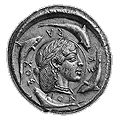 c. 480 BC 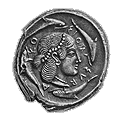 c. 470 BC  c. 460 BC 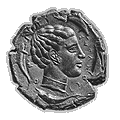 c. 440 BC 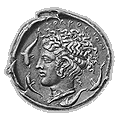 c. 420 BC 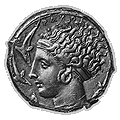 c. 400 BC 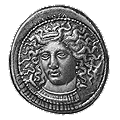 c. 410-400 BC 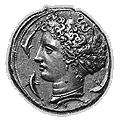 c. 405-400 BC  c. 390 BC |
| ||||||||||||||||||||||||||||||||||||||||||||||||||||||||||||||||||||||||||||||||||||||||||||||||||||||||||||||||||||||||||||||||||||||||||||||||||||||||||||||||||||||||||||||||||||||||||||||||
Ancient Greek CoinsThese same illustrations may be found in:
by G. K. Jenkins
G. P. Putnam’s Sons, New York, 1972
Coins of Greek Sicily
by Kenneth Jenkins
British Museum Publications Limited
University Press, Oxford, 1976
The complete text of the English translation of the Metamorphoses containing the extract above can be found at the Internet Classics Archive.
Another Roman poet, Virgil (Publi Vergili Maronis, 70-19 BC), refers to Arethusa’s story in his epic Aeneid in the following lines from Book III (English translation by John Dryden ):
|
Right o’er against Plemmyrium’s wat’ry strand, There lies an isle once call’d th’ Ortygian land. Alpheus, as old fame reports, has found From Greece a secret passage under ground, By love to beauteous Arethusa led; And, mingling here, they roll in the same sacred bed. |
Sicanio praetenta sinu iacet insula contra Plemyrium undosum; nomen dixere priores Ortygiam. Alpheum fama est huc Elidis amnem occultas egisse vias subter mare; qui nunc ore, Arethusa, tuo Siculis confunditur undis. |
In addition, the Perseus Project contains a passage from Pausanias (Description of Greece, [5.7.2]) giving his version of the legend of Arethusa.